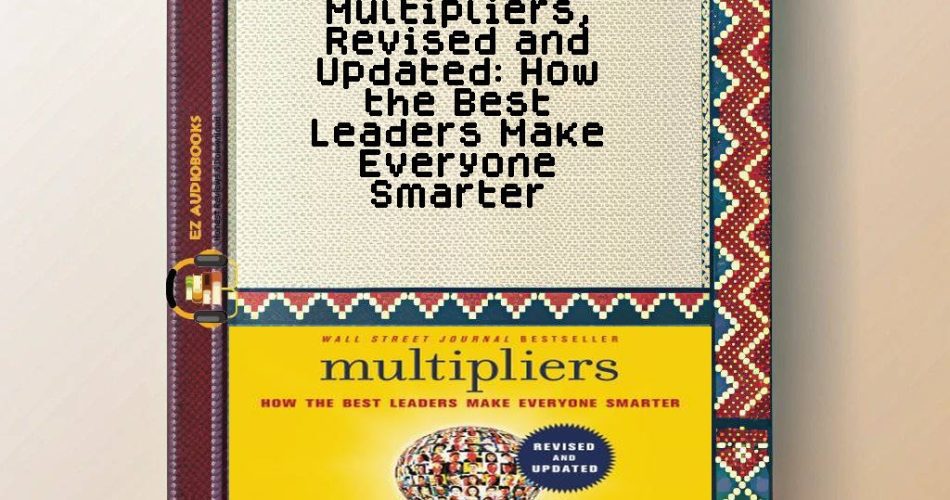Audiobook Sample
Listen to the sample to experience the story.
Please wait while we verify your browser...
- Title: Multipliers, Revised and Updated: How the Best Leaders Make Everyone Smarter
- Author: Liz Wiseman
- Narrator: John Meagher, Liz Wiseman
- Length: 11:25:00
- Version: Abridged
- Release Date: 16/05/2017
- Publisher: HarperAudio
- Genre: Business & Economics, Management & Leadership, Business & Economics, Management & Leadership
- ISBN13: 9.78E+12
Today, I invite you to delve into the audiobook experience of ‘Multipliers, Revised and Updated: How the Best Leaders Make Everyone Smarter’ by Liz Wiseman, a compelling exploration of leadership dynamics in the sphere of Business & Economics and Management & Leadership. From the outset, this audiobook captured my attention with its promise to dissect why some leaders drain energy while others amplify intelligence. What fascinates me most is how Wiseman constructs a vivid dichotomy between ‘Diminishers’ and ‘Multipliers,’ a framework that resonates deeply with anyone who has navigated the complexities of organizational life.
Through a cultural lens, this work feels like a modern parable, echoing the ancient Confucian ideals of leadership I encountered during my time as a visiting professor in Tokyo. Much like the Eastern philosophies that emphasize harmony and collective growth, Wiseman’s Multipliers are leaders who cultivate talent, inspire innovation, and harness collective intelligence. This reminds me of when I facilitated a seminar at Berkeley on storytelling mediums, where we debated how narratives shape perception. Listening to ‘Multipliers’ in audio form, I found the narrative structure even more potent – ideas of empowerment and collaboration seemed to leap from the spoken word, much like they did during our vibrant classroom discussions of ‘Cloud Atlas.’ The audiobook format, with its intimate delivery, mirrors the personal impact a true Multiplier can have in a workplace.
Wiseman’s content is grounded in rigorous research, drawing from data on over 150 leaders to identify five disciplines that distinguish Multipliers from Diminishers. These disciplines – Talent Magnet, Liberator, Challenger, Debate Maker, and Investor – are not innate traits but learnable skills, a revelation that democratizes effective leadership. The addition of new chapters in this revised edition, particularly on accidental Diminishers and strategies to handle them, adds a nuanced layer to the discussion, addressing the unintended ways we might suppress potential. As someone who studies cross-cultural narratives, I appreciate how Wiseman incorporates real-world case studies, weaving stories of diverse leaders into a cohesive tapestry of actionable insights. Her analysis of how Multipliers drive innovation with fewer resources is particularly relevant in today’s Management & Leadership landscape, where efficiency and inspiration must coexist.
Turning to the listening experience, the narration by John Meagher and Liz Wiseman herself is a standout feature of this audiobook. Meagher’s clear, authoritative tone brings a professional gravitas to the case studies and data, making complex concepts accessible to both seasoned executives and aspiring leaders. Wiseman’s personal narration of certain segments adds an authentic touch, as if she’s mentoring you directly through her insights. The audio quality is crisp, with seamless transitions that maintain engagement over the duration – ideal for those long commutes or quiet evenings of reflection. This audiobook experience enhances the text’s impact, allowing the listener to absorb leadership strategies aurally, much like one might internalize a mentor’s advice in a one-on-one session.
Yet, while I celebrate the strengths of ‘Multipliers,’ I must offer a balanced perspective. The audiobook, while rich in anecdotes, occasionally leans heavily on narrative at the expense of deeper empirical analysis, which might leave some listeners in the Business & Economics field craving more data-driven depth. Additionally, while the dual narration is generally effective, there are moments where the shift between voices can feel slightly jarring, briefly disrupting the flow. These minor critiques aside, the overall production remains a powerful tool for personal and professional growth.
For comparison, I’d place ‘Multipliers’ alongside works like Mark Manson’s ‘The Subtle Art of Not Giving a F*ck,’ though they diverge in focus. While Manson emphasizes personal responsibility and selective focus, Wiseman’s lens is organizational, urging leaders to amplify collective potential. Both, however, challenge conventional wisdom, pushing listeners to rethink ingrained behaviors. In the realm of Management & Leadership audiobooks, ‘Multipliers’ stands out for its actionable framework, akin to the pragmatic advice in ‘The Happiness Hypothesis’ by Jonathan Haidt, yet more directly tailored to workplace dynamics.
I recommend this audiobook to anyone in a leadership role or aspiring to one – be it in corporate settings, academia, or community initiatives. It’s particularly valuable for those seeking to understand how to foster innovation and talent development, key themes in today’s Business & Economics discourse. The audiobook format makes it an accessible companion for busy professionals who can absorb its lessons on the go. If you’re intrigued by the idea of a free audiobook experience, exploring platforms that offer trials or promotions could be a gateway to accessing ‘Multipliers’ without cost, enhancing its reach to eager learners everywhere.
Reflecting on my own journey, listening to ‘Multipliers’ stirred memories of my early teaching days, when I struggled to balance authority with empowerment in the classroom. I recall a particular semester at Berkeley where a student’s potential blossomed only after I stepped back, allowing space for their ideas to flourish – a Multiplier moment before I even knew the term. Wiseman’s insights have reframed those experiences, offering a language and structure to what I instinctively felt. This audiobook has not only enriched my understanding of leadership but also prompted me to reflect on how I can amplify the voices in my own academic and literary communities.
As we close this chapter of exploration, I encourage you to listen, reflect, and multiply the brilliance around you. With warm regards and endless curiosity, Prof. Emily Chen.

